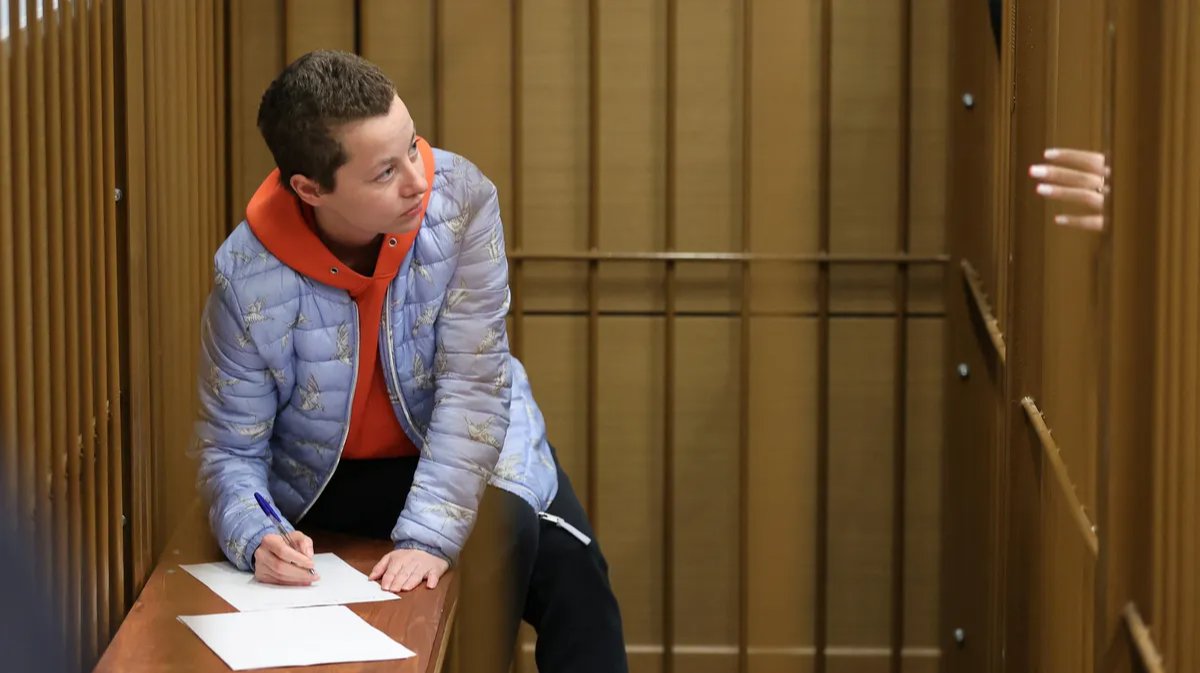Muratov the cat is the star of her Instagram. Cheesecake and pie recipes, translations, screenplays, theatre plays, collecting money for charities — all this is Zhenya Berkovich. If worst came to worst, she planned to emigrate to the Afonkino village in the Tyumen region instead of Berlin. At the peak of her career, she adopted two teenage girls who went through children’s homes and betrayals — this is her. Writing anti-war poems that make you shiver, while remaining in Russia — this is her once again.
Let me introduce you to Zhenya Berkovich, 38. A feminist, director, mother, a person Russian director Kirill Serebrennikov refers to as his best student. Today, she faces up to seven years over charges of “justifying terrorism” for putting on a play — Finist, the Brave Falcon.
We are publishing a portrait of Evgenia, who’s too independent and too unconventional for Russian film and theatre industries. The person who, when she talks about herself, says that the thing she fears most in life is being afraid.
Childhood
Evgenia (or Zhenya for short) Berkovich was born in Leningrad on 29 April 1985 into the family of poet and novelist Boris Berkovich and philologist and journalist Elena Efros.
Her paternal great-grandfather, Lev Mayzelis, was sentenced to be executed in 1938 for “participating in a military conspiracy”. He was rehabilitated in the year the Stalin personality cult was debunked — in 1956. Lev’s daughter Galina, a teacher of Russian language and literature, had a lot of impact on Zhenya and her older sister Maria.
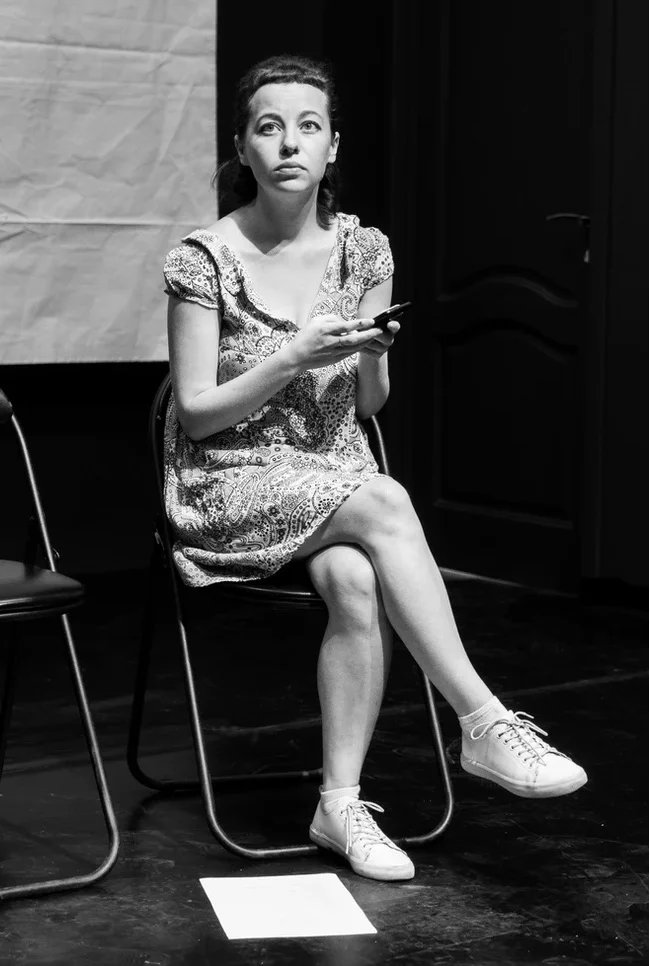
Zhenya Berkovich. Photo: Facebook
Their maternal grandmother Nina Katerli is a writer, publicist, and human rights defender. In the past, she was questioned by the KGB for sending her works to Western countries. Her daughter Elena Efros, Zhenya’s mum, is known for coming up with and managing the Fairy-tales for Political Prisoners project. Within this project, people write fairy-tales and send them to people held in custody for their convictions, whatever they may be.
Berkovich spent her childhood in Leningrad, later renamed St. Petersburg. Together with her sister Maria, she was a member of the Theatre of Youth Creativity. According to her relatives, that was where Zhenya first got into directing. And that was where Berkovich put on her first plays — with teenage actors.
In 2007, Berkovich graduated from the St. Petersburg Academy of Theatre Arts, her speciality was theatre historian and manager. She continued working at the Theatre of Youth Creativity as a director and teacher for a year after graduating, and then she left for Moscow.
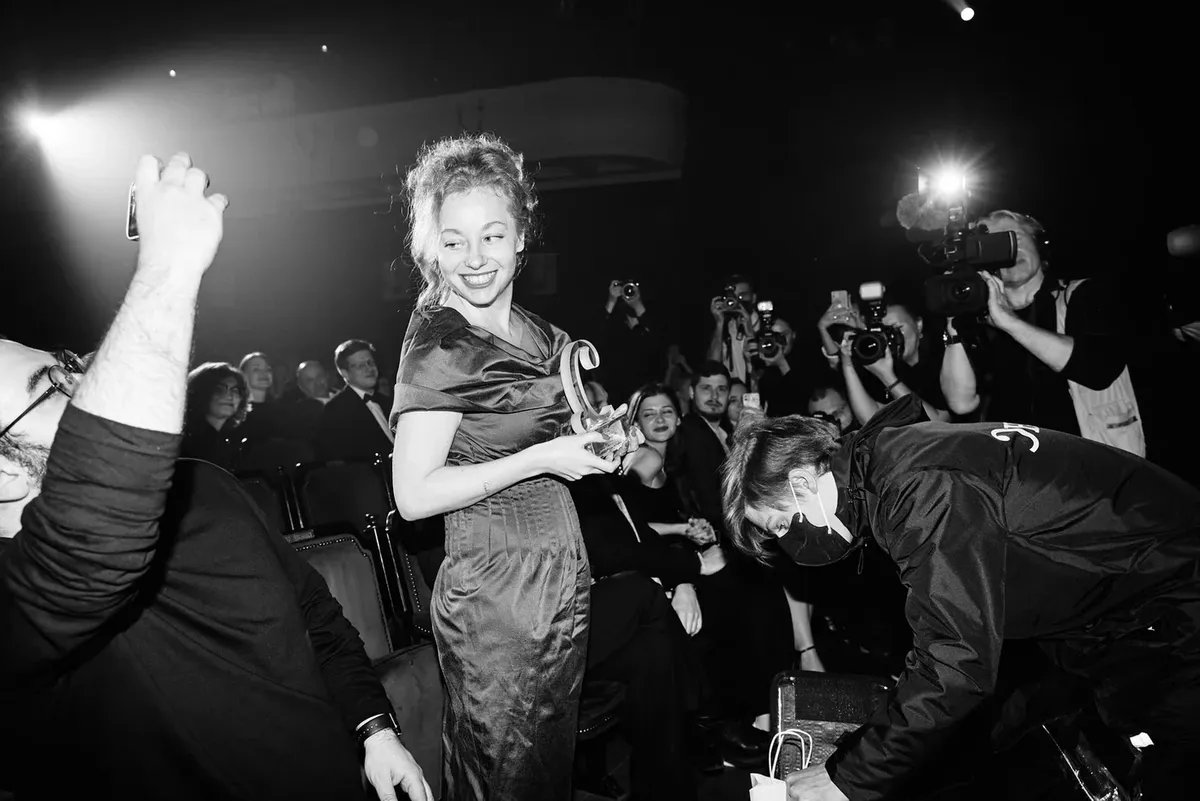
Zhenya Berkovich at an award show Photo: Dima Smirnov, SOSO Daughters
Moscow and Kirill Serebrennikov
Berkovich ended up in the Russian capital in 2008, when she was 23. She tried to apply to the Moscow Art Theatre School, the directing department, but her first attempt failed. Must have been fate. She came back next year, the year when the course was taught by Kirill Serebrennikov. And she got in.
Berkovich’s graduation piece was the play Lark based on the play of the same name by Jean Anouilh. The plot sees Joan of Arc become a metaphor for state justice. Eleven years later, when Berkovich is held in a pre-trial detention facility for another one of her plays, her former teacher Serebrennikov will write her an open letter, in which he will confess for the first time that:
“I always wanted to say how much I love you, but the false rigidity of the ‘course master’ would not let me. You’re my favourite student. The most talented, the most intelligent, the most free. You’re wonderful. The best. Unique. My favourite. I’m sorry I taught you not to lie and not to be afraid, taught you honest theatre, taught you to ‘speak’ and to ‘be’. <...> I won’t tell you to ‘stay strong, Zhenya’. You will do so, I know you, you’re strong. You have to go through hell, and then it will be easier. Do you remember the play Lark that you debuted at the Moscow Art Theatre School? It goes exactly like that — at first it hurts, hurts so much, but then it gets easier. The belief that you’re right and are not guilty of anything saves you in the darkest hell. And remember — this shit will end sooner or later. You’re a Star. You’re Light. You’re Love. These bastards will die and no one will remember their name, but you will remain.”
Feminism and freedom
“Well, yes, I’m a feminist. This is a conscious, motivated stance. <…> At the end of the day, I’m a woman. But there are a lot of circumstances when I don’t insist on [my views]. It’s an important issue but I don’t think that it requires battling in blood every time. I have the right to call myself whatever I want.”
This is what Zhenya told journalists about her feminist views.
In autumn 2018, she founded an independent theatre project SOSO Daughters, which has never received state funding; it exists mostly through grants from private foundations.
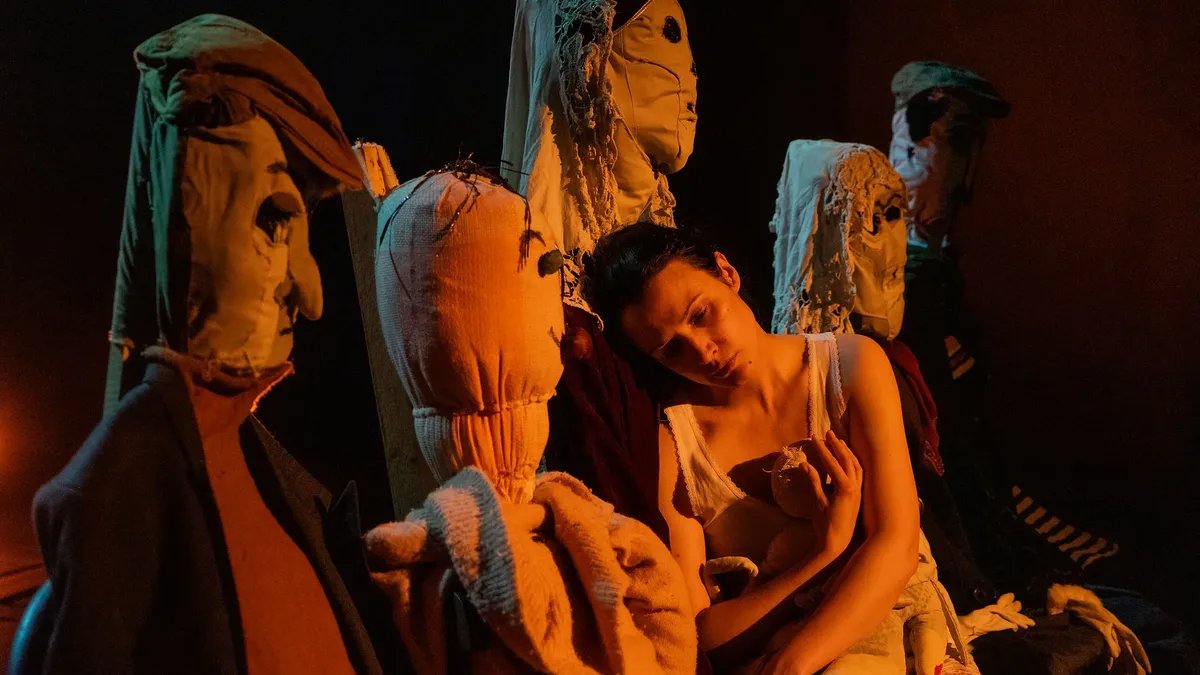
A scene from A Counting Rhyme, a play by Berkovich. Photo: SOSO Daughters
In 2020, SOSO Daughters premiered the infamous play that activists of the pro-Kremlin National Liberation Movement wrote a denunciation about, which in three-years’ time would lead to Evgenia Berkovich and playwright Svetlana Petriychuck ending up in a pre-trial detention facility charged with “justifying terrorism”.
The play
The play Finist, the Brave Falcon, based on documents and prison sentences, is about women who married followers of radical Islam and moved to Syria. Here’s what Berkovich said about the play to the media:
“This is a story about modern Russian girls who meet Islamic fundamentalists-terrorists online, move there as brides, and well, we know what happens next. Some are caught along the way; some manage to leave. The play is so poetic, so beautiful! But it’s also very tough, very scary.”
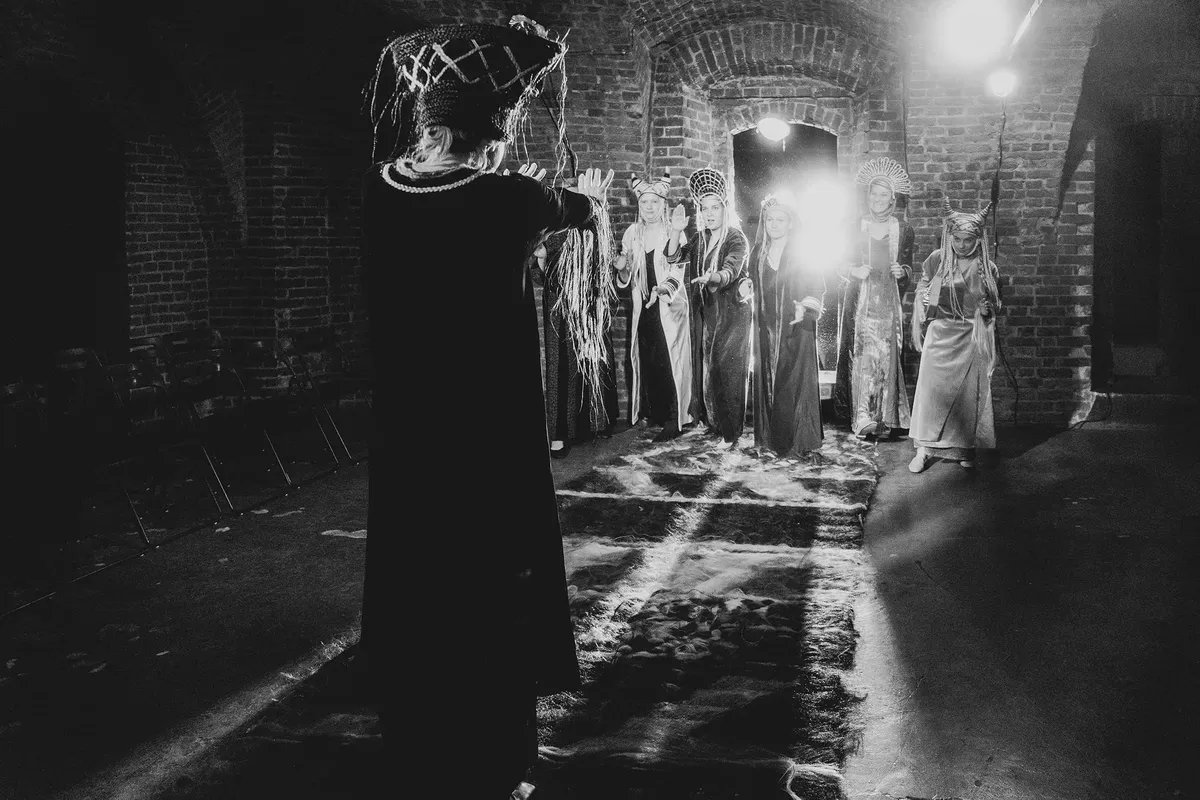
A scene from Finist, the Brave Falcon. Photo: Facebook
“Would you like it if girls who are currently planning to join IS watched this play? Have you considered that your play could make them change their mind?” journalist Alexey Polikhovich asked her.
“I hope that whoever watches this play, whatever their circumstances are, will be 0.5% less likely to join a totalitarian cult. Because they are the same thing,” Berkovich replied.
Finist, the Brave Falcon was one of the most talked about plays of 2020-2021. It was awarded with a diploma of the Theatre Critics Association, and won two National Theatre Awards Golden Mask for Best Costume Design and Best Playwright.
Support independent journalism
Mum
At the time of her arrest, Zhenya Berkovich has been a mother for five years. She adopted two teenage girls. Before that, she was childfree by choice. But life had other plans.
For several years, Berkovich worked as the artistic director of a festival for teenagers from children’s homes I’m Not Alone, which helped them try themselves in the arts. Teenagers studied stage speech, movement, dance, vocal, and put on plays.
Among other things, the project gave the participants a chance to find parents or guardians. Berkovich herself met a young girl named Kira, who, according to Zhenya, “found a place in her heart forever”. Zhenya realised that she would like to have a foster child, but not so soon.
Berkovich and her colleagues first decided to find Kira a family. They found a woman who took her in, who already had another adopted daughter — Anya. However, just a few months later, the foster mum got very sick. The girls were returned to the care home. After finding out about it, Berkovich decided to immediately file for temporary guardianship to get them out of there. And then it became clear that the foster mum would not make it. So Berkovich took the girls in.
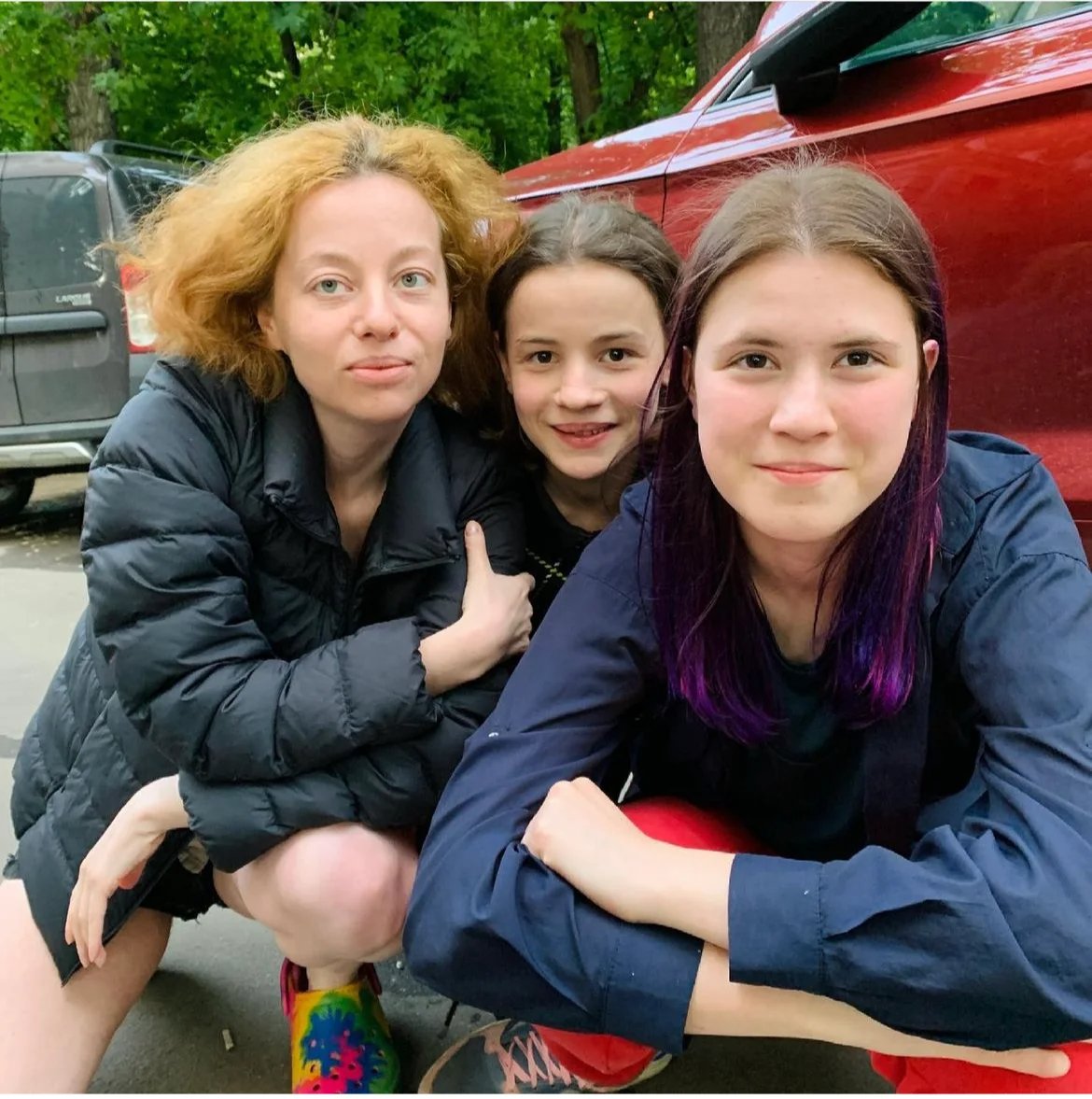
Zhenya Berkovich with daughters Kira and Anya. Photo: Instagram
In 2022, Berkovich got married to her colleague from SOSO Daughters and officially adopted the girls.
Today, Anya (who’s already 18) and Kira, who’s a minor, are staying with Berkovich’s husband.
Citizen
“I don’t really care how wide the sidewalk is if I can walk it together with the people I want and loudly proclaim the things I want to say,” she said in 2020 in an interview with media outlet Moskvich Mag. “I don’t like the riot policemen with batons who break up peaceful assemblies, who make us step down from the sidewalk.
I don’t like that in Moscow, we live alongside millions, or maybe dozens of millions of people with no rights at all, migrants. And we pretend that this underwater part of the iceberg is not a part of our lives.”
On the day the war in Ukraine started, 24 February 2022, Evgenia Berkovich was detained for several hours after she had staged an anti-war picket. She was the first theatre figure to openly state that she was against the war. Over the past year, she has been regularly posting anti-war poems on her Facebook page. Furthermore, she purposefully remained in Russia. She joked that if something were to happen, she’d migrate to the Afonkino village in the Tyumen region instead of Berlin.
In autumn 2022, together with the Department One project (a team of lawyers specialising in defending citizens with treason charges), OVD-Info (proclaimed a “foreign agent” by the Russian authorities), and the Moscow Helsinki Group (recently liquidated by the Russian government) Berkovich ran an auction for people persecuted under “censorship” articles — the one about “discrediting the Russian army’s actions” and the one about “spreading fake news” about the army. They collected 3 million rubles (€36,000).
She also helped collect money to support the Lighthouse Charity Foundation that helps refugees, Svetlana Stroganova’s organisation Our Children (for children from Russian care homes), and the Nochlezhka non-profit that helps homeless people. Representatives of all of these organisations came down to the court building in Moscow on 6 May while a measure of detention for Berkovich and Petriychuk was being considered. Many of the organisation heads vouched for Zhenya.
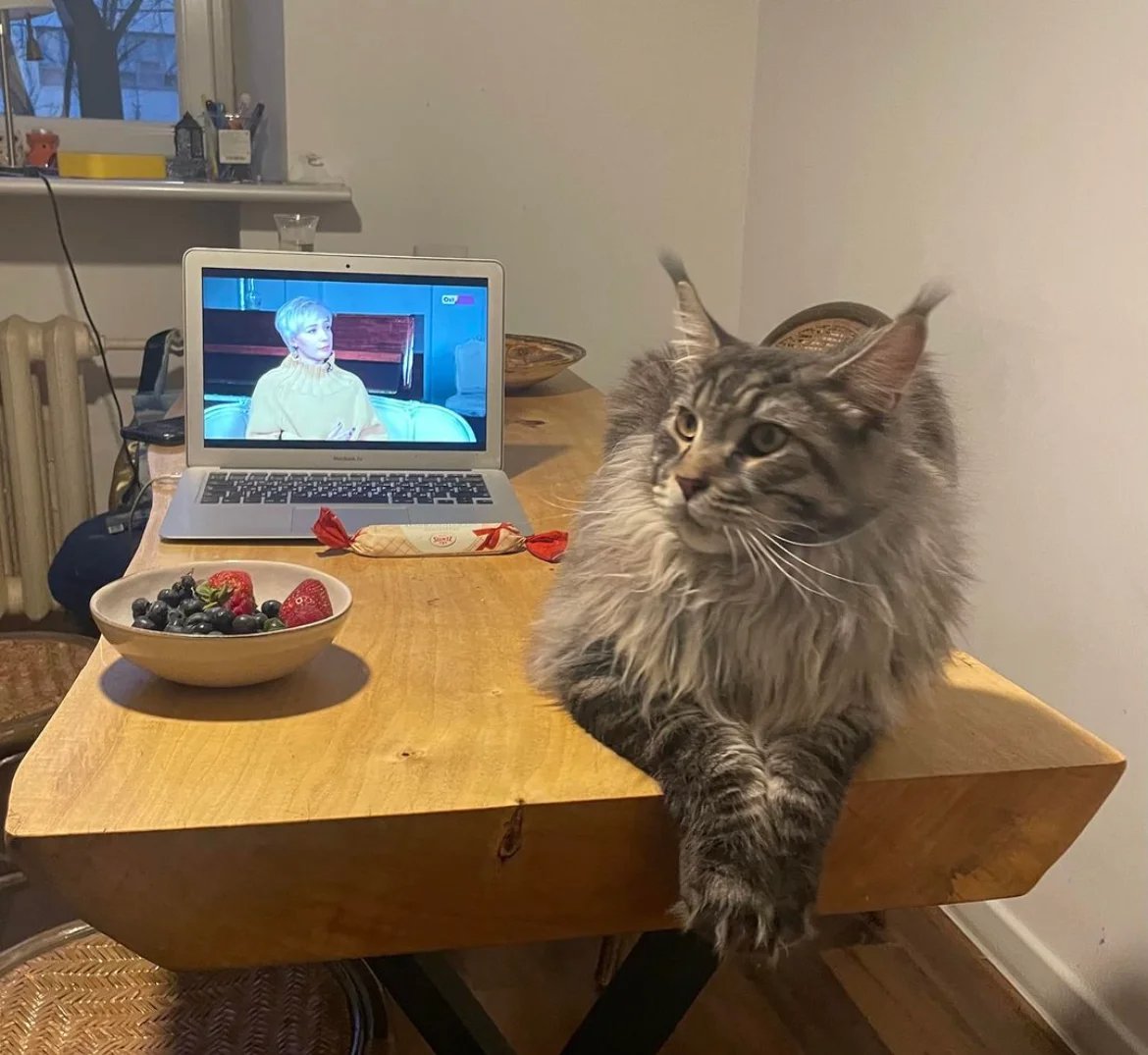
Muratov the cat. Photo: Instagram
Muratov the cat and the ‘Proper Russian Opposition’
In Autumn 2022, the Berkovich family adopted a big, nine-kilo, green-eyed Maine Coon. Someone threw the cat out on the streets. Zhenya’s friend picked him up, got him treatment, and then gave him to Berkovich. At that time, she had another cat named Chipa. Berkovich took the cat in and named him Muratov — to honour editor-in-chief of Novaya Gazeta and Nobel Laureate Dmitry Muratov.
Muratov (the cat, not the Nobel laureate) slept on the keyboard, demanding to be petted, while she wrote scripts. Muratov heard her berate the kids. Muratov hunted pancakes and flowers on the table. Sometimes, when the kids didn’t pay attention, Muratov ran away from the flat if the front door stayed open. Then Berkovich had to go after him to the upper floors and bring the nine-kilo beauty back home.
Muratov also let his owner take photos of him for play ads.
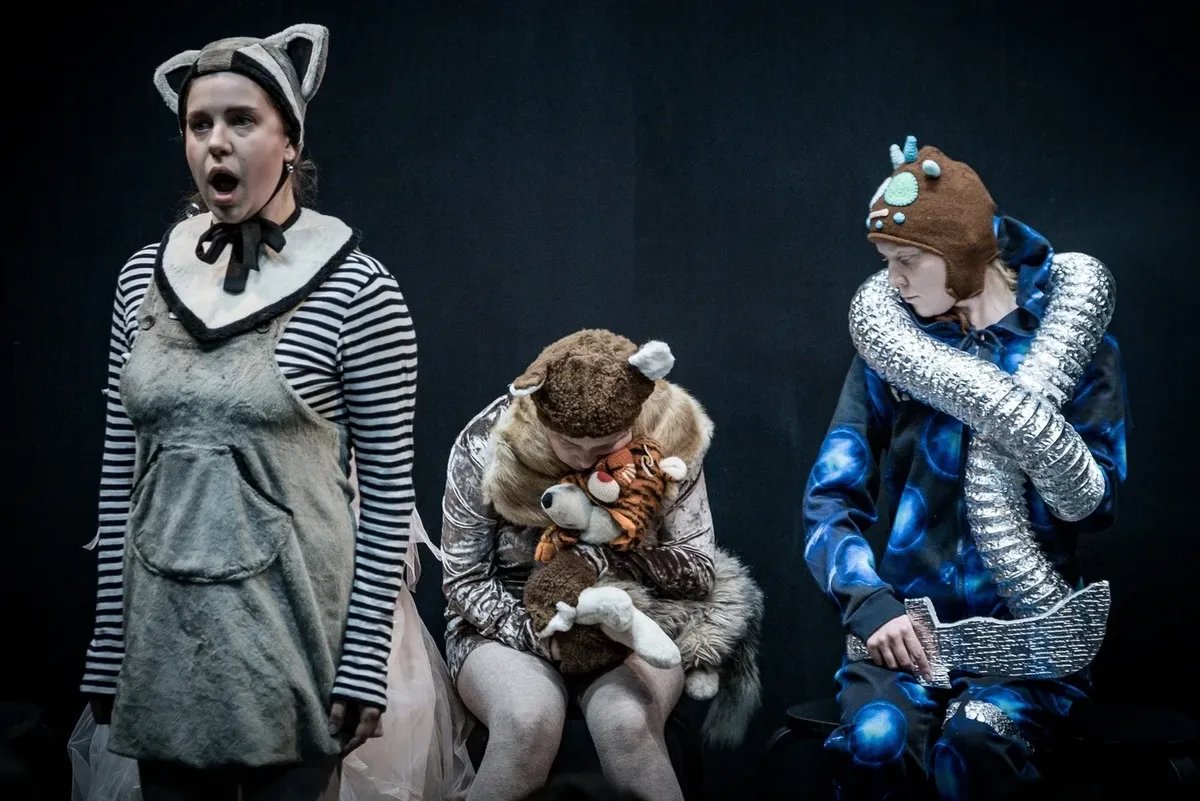
A scene from Blue Rice Dog. Photo: SOSO Daughters
Among Berkovich’s latest plays were, for example, Blue Rice Dog, in which actresses read poems written by Russian-speaking poets. The play is about what changed in the world, in the lives of adults and children, toys, dogs, and what will never be the same.
Another one of Berkovich’s latest works is a play based on her own play Our Treasure, which is also partially about the war. A Christmas fable featuring angels, Bethlehem cops, talking animals, loving mothers, and Herod the Great who ordered execution of babies.
Berkovich has also recently put on an inclusive play Mumu featuring deaf artists.
On the eve of her detention on “justifying terrorism” charges, Evgenia Berkovich deleted her Facebook page. “[Got a lot of criticism] from the Proper Russian Opposition and I’m a bit tired. That’s the short of it,” she explained to her Instagram followers.
At that moment, she was being hounded on Facebook because of her post about adopting Ukrainian children. Berkovich wrote that she was ready to assume custody of the children brought from Donbas to Russia to later help them go back to Ukraine.
Ekaterina Margolis, a writer and painter who lives in Venice, got into an argument with Berkovich. Margolis is known for her iron conviction that Russian citizens who are against the war have to be helping Ukraine’s Armed Forces instead of “formally” sympathising with Ukrainians. The level and size of sympathy is defined by her, Margolis, who’s in Venice. And she knows that in today’s Russia, any help to Ukraine’s Armed Forces, including financial, ends with people in prison with charges of “high treason”.
The Russian government recently upped the punishment for “high treason”, it can now go all the way up to a life sentence. Margolis went as far as to say that Berkovich’s “role in her own adoptions is quite dubious”. However, Margolis did not cite any sources or concrete information to support her claims. But afterwards, Berkovich’s Facebook page was found by angry citizens just like Margolis. And Evgenia deleted her page.
Many observers thought that the theatre director being attacked on social media was a precursor to her being visited by law enforcement officers, even though the denunciation about the Finist, the Brave Falcon play was filed by the activists of the National Liberation Movement two years before that. But for some reason, the police officers remembered its existence only now, when Zhenya wrote about the children she would like to help return to Ukraine.
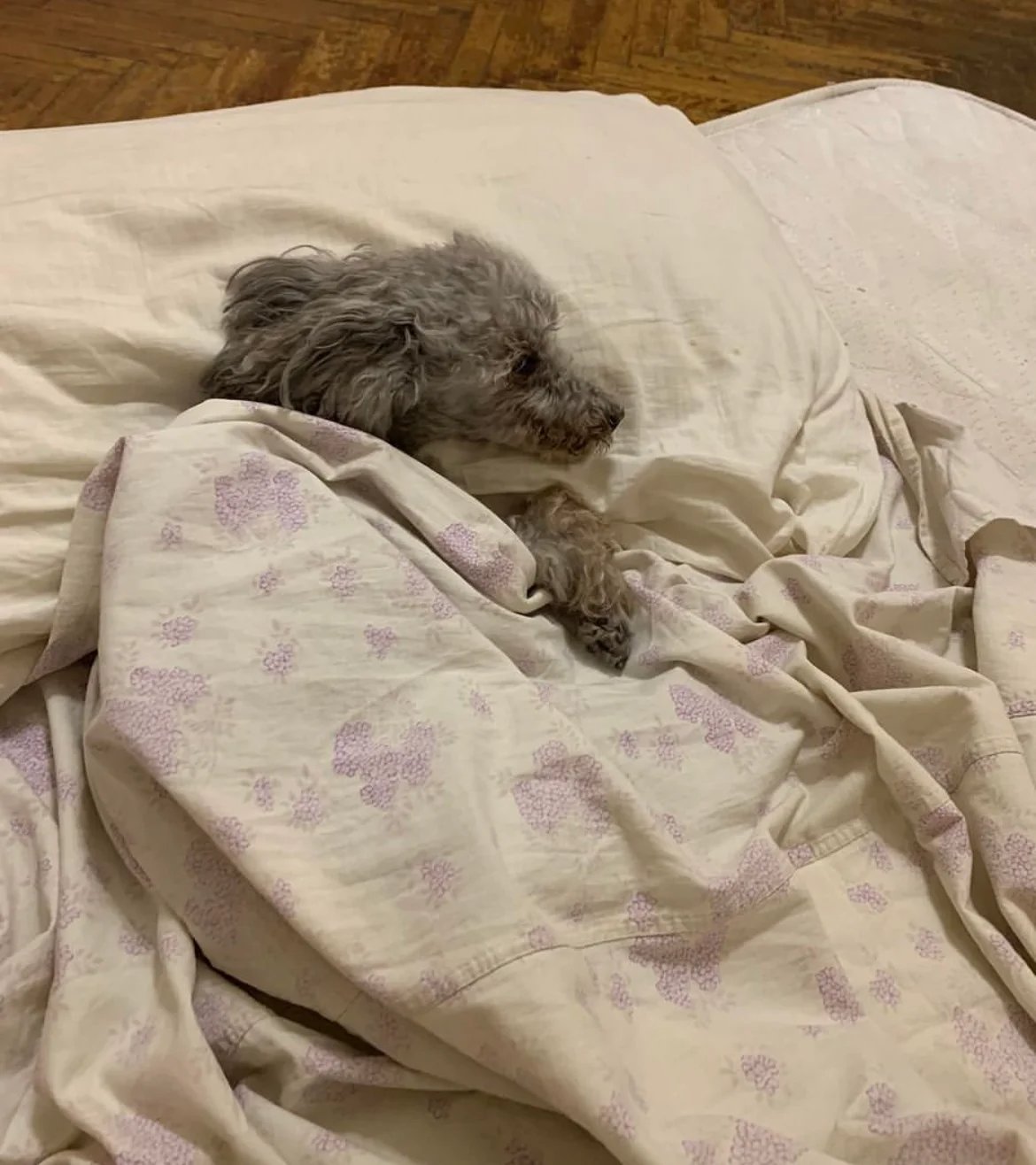
Danil Ivanovich, Zhenya Berkovich’s dog
P.S.
Nine months before her detention, Zhenya Berkovich posted a photo of her youngest daughter Kira and an old poodle named Danil Ivanovich with this caption: “I (Me! A person committed to being childfree!) find myself thinking that I want to spend time with them. I always have this little thought in the back of my mind: who knows how much time we have left together? And no, that’s not me attracting negativity and all that nonsense. It’s just that before, the fragility of human freedom and life wasn’t felt so strongly. And of dogs, too.” The dog did not live long enough to see her being detained. He died a month after this post.
Join us in rebuilding Novaya Gazeta Europe
The Russian government has banned independent media. We were forced to leave our country in order to keep doing our job, telling our readers about what is going on Russia, Ukraine and Europe.
We will continue fighting against warfare and dictatorship. We believe that freedom of speech is the most efficient antidote against tyranny. Support us financially to help us fight for peace and freedom.
By clicking the Support button, you agree to the processing of your personal data.
To cancel a regular donation, please write to [email protected]
